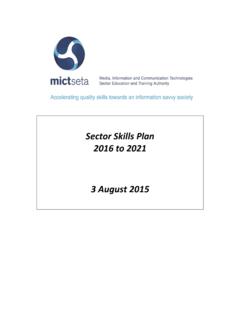Transcription of ONLINE LETTER OF INTENT MANUAL - MICT SETA
1 Our Vision: To be recognised as the leader in the development of a highly skilled knowledge-based information society. Our Mission: The MICT SETA generates, facilitates and accelerates the processes of quality skills development at all levels in the MICT sector. ONLINE LETTER OF INTENT MANUAL 2017/2018 A guideline to apply for Discretionary Grant Page 1 of 18 Discretionary Grants Guide for employers DISCRETIONARY GRANTS APPLICATION PROCESS Discretionary grant: The purpose of discretionary grants is to encourage employers and stakeholders to contribute towards the achievement of the objectives of the Human Resources Development Strategy (HRDS), the National Skills Development Strategy (NSDS), and the Sector Skills Plan (SSP).
2 The of the levy contribution from employers is allocated to the Discretionary Grant. This money is utilised at the discretion of the SETA to sponsor learning programmes with employers who request sponsorship and who intend implementing learning programmes that support the strategy of the SETA. A Discretionary Grant is that is allocated to a levy paying company to develop the skills of both the employed and unemployed people. A Discretionary Grant is not viewed as income to an organisation and therefore is not taxable. A Levy-Paying Employer intending to apply for Discretionary Grant should have sent through their Work Skills Plan and Annual Training Report (WSP/ATR) to MICTSETA ONLINE before closing date (30 April for each new financial year (1 April)).
3 The 2013/18 Strategy of the MICT SETA A summary of the MICT SETA 2013/18 NSDS III strategic goals that relate to Discretionary funding are: FET learners supported through bursaries. Universities and Universities of Technology learners supported through bursaries. Middle level skills programmes implemented. Learner progression implemented through Learnerships including townships and rural. Students supported through internship programmes of which at least 70% placed. Work experience offered to college learners through internship programmes Provision of quality short courses agreed by top 10 MICT stakeholders in each subsector. Provision of quality skills programmes agreed by top 10 MICT stakeholders in each subsector.
4 Short course projects in place to address specific sector skills gaps. Applying for PIVOTAL grants In order to obtain a PIVOTAL grant from the MICT SETA, employers and other institutions that meet the MICT SETA criteria for PIVOTAL grants shall: Complete and submit a, Annual Training Report (ATR), Workplace Skills Plan (WSP) and PIVOTAL Training Plan (PTP) by 30 June 2013 and thereafter by 30 April each year, using a prescribed template that is accessible from the MICT SETA s SETA Management System (SMS). The MICT SETA PIVOTAL grant shall be applied for through the LETTER of INTENT (LoI) as provided by the MICT SETA on its website. In certain circumstances, a co-funding approach shall be employed, wherein a funding partnership between the MICT Seta and the implementing company shall be entered into.
5 Qualifying companies that implement the MICT SETA PIVOTAL programmes in rural areas and those that target people with disabilities shall be eligible for a 100% PIVOTAL grant. Page 2 of 18 Discretionary Grants Guide for employers Skills programme projects in place to address specific sector skills gaps. Skills development with SMEs through internship /learnership programmes. Skills development with selected trade unions, NGOs and community-based organisations expanded through partnership NSF funding. The Discretionary Grant Evaluation Committee and Process The MICT SETA has a Discretionary Grant Evaluation Committee (DGEC) comprising the Senior Managers of the Learning Programmes Division, the Quality Assurance Division, and the Sector Skills Planning (SSP) Division.
6 The DGEC evaluates all Letters of INTENT (a proposal from the employer requesting sponsorship). If recommended for approval by the DGEC, this recommendation is forwarded to the CEO of the MICT SETA who will usually approve the request for sponsorship. Once approved by the CEO, the Learning Programmes Division will compile a draft Service Level Agreement (SLA) based on the content of the LETTER of INTENT . Should the employer want some changes on the application, this should be done in writing to the Discretionary Grants Evaluation Committee otherwise, the final draft of the SLA is signed by the MICT SETA representative and the employer SLA representatives, then returned to the MICT SETA. Discretionary Grant Evaluation Criteria Constituent Employer Levy paying employer (up to date) Workplace Skills Plan submission and approval Alignment to Priority Skills: Should you require information regarding the Critical and Scarce Skills in the MICT SETA Sector, please download our Sector Skills Plan from the following link: and for other relevant documents.
7 Budget (PIVOTAL against Non PIVOTAL) B-BBEE: Skills development code (3% of leviable amount) Still implementing (Completion report for previous programme ) Tax Clearance 3 month bank statement (SMEs) Motivation (LOI) Applying for Discretionary Grant Discretionary Grants: This is funding awarded to the MICT SETA stakeholders who are providing training that address respective workplaces scarce and critical skills and assists in the achievement of the MICT SETA commitments to the Department of Higher Education and Training. No employer should start any training before the SLA is signed by all relevant parties. As implied above, at least two months should be planned for the application process, from date of submission to the MICT SETA through to the signing of the SLA.
8 Employers wishing to apply for sponsorship can do so at any time during the year. It was written before that Employer can apply for only one type of learning programme per LoI; Employers can now apply for multiple learning programmes on one application. The SLA will be for one type of Page 3 of 18 Discretionary Grants Guide for employers learning programme only. The types of learning programmes are learnerships, internships, skills programmes, full tertiary qualifications and short courses. 1. Pivotal programmes: Professional, vocational, technical and academic learning programmes that result in qualifications or part qualifications on the National Qualifications Framework. Learnership Programmes A Learnership results in a qualification.
9 It is a workplace education and training programme comprising of both structured practical workplace (on-the-job) experience (70% of the content) and structured theoretical training (30% of the content) conducted against registered Unit Standards at an accredited Training Institution. The duration of a Learnership is approximately twelve months. Skills Programmes A Skills programme is an occupationally directed learning programme compromising of both theory and practical work experience it is unit standard based and bears credits that lead to a registered qualification. The duration of MICTSETA Skills programme shall be three to six months. Bursary programme A bursary is a grant allocated to learners who are studying or registered to study in academic learning programmes registered with Council of Higher Education (CHE) that lead to academic qualifications such as Higher Certificates, Diploma and Degrees.
10 The Bursary grant shall be awarded for the duration of the qualification for qualifying learners studying or intending to study within MICT Sector and shall be annually renewed subject to the Bursar s successful completion of the academic year Sponsored. Workplace Integrated Learning (In-Service Training) The Workplace Experience programme / Work Integrated Learning programme is a programme that is undertaken to workplace for the purposes of exposure to the workplace experience to complete a qualification. The duration should be six to twelve months depending on the institutional requirements. 2. Non-Pivotal Programmes: These learning programmes are not NQF aligned and are not registered on National Qualifications Framework with South African Qualifications Authority; therefore they do not bear any credits or lead to a qualification.










